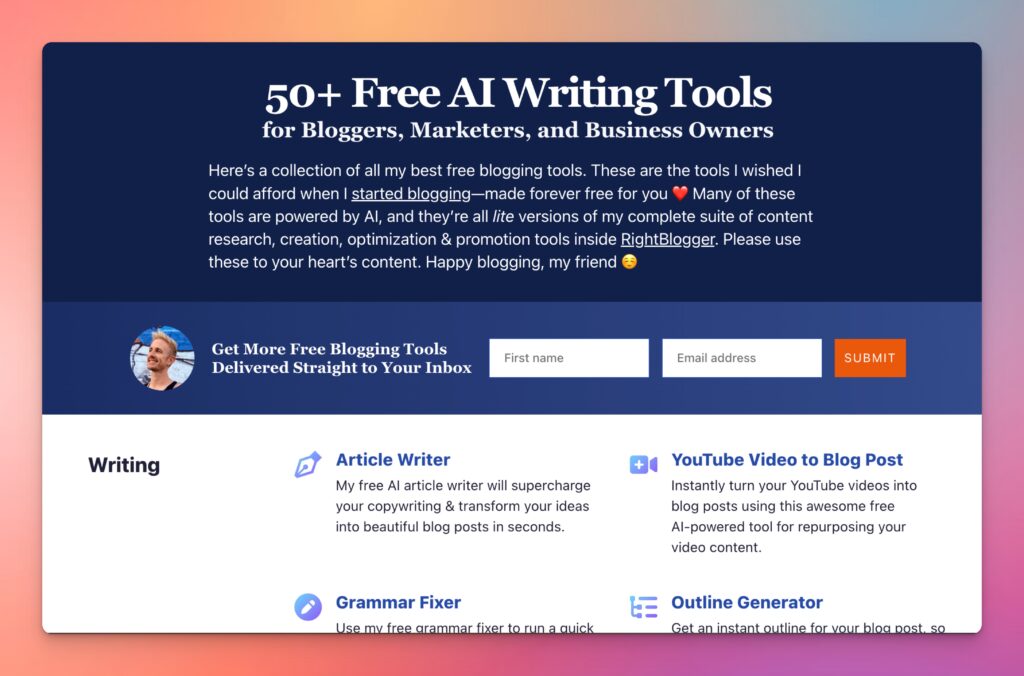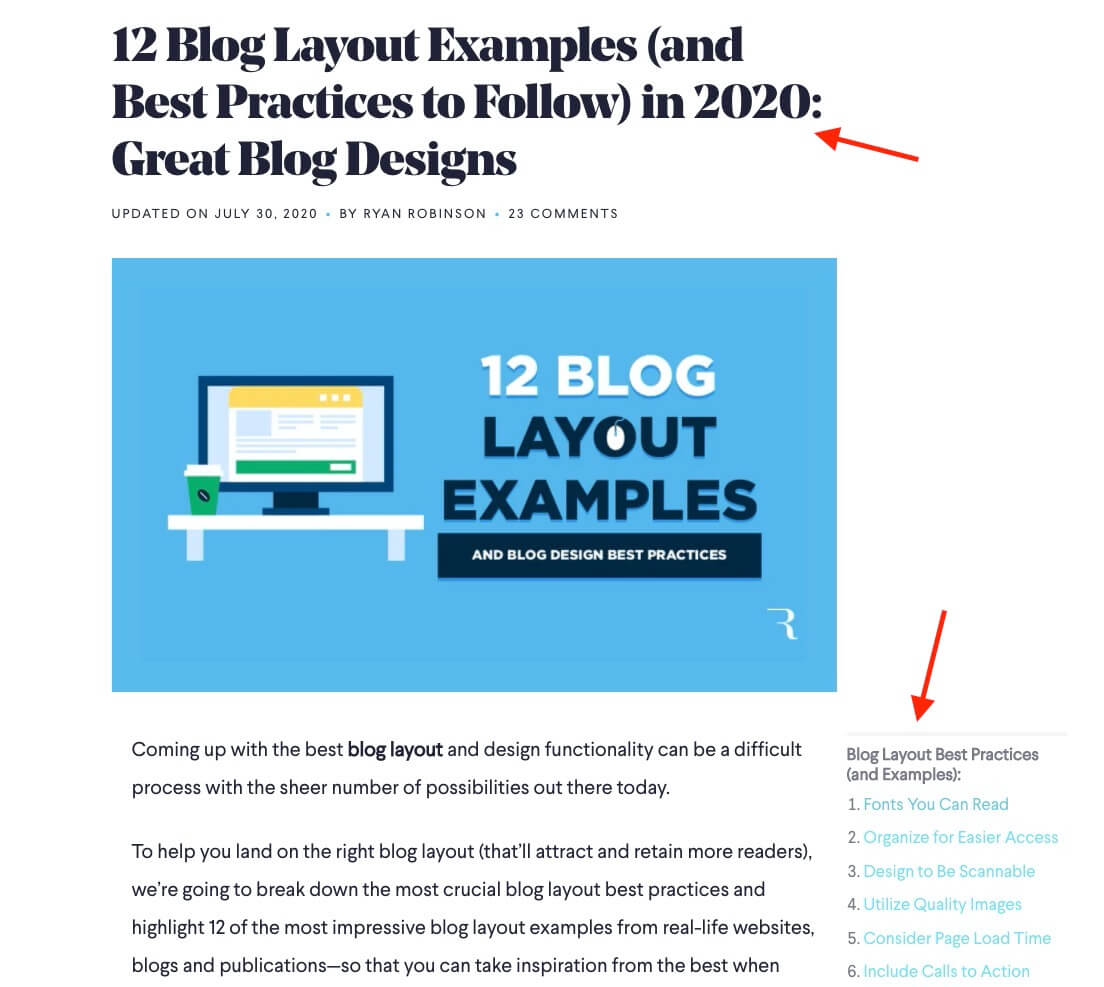We’re here to answer, do people still read blogs? So, let’s get right to it.
Do people still read blogs?
Yes, people still read blogs today (in record numbers) and will almost certainly continue reading blogs for many years to come. In fact, an overwhelming 77% of Internet users report regularly reading blog posts according to the latest blogging statistics.
However, despite a consistent increase in the number of people reading blogs, how we read them (and the types of content people like reading) is changing quite a lot. The average reader only spends 37 seconds reading a blog post today, which makes clear that most people are unlikely to read an entire blog post from start to finish—and instead scan for the information they’re looking for.
So, if you’re wondering… are blogs still a thing? Well, the evidence is clear that people do still read blogs in record numbers today (and yes bloggers still make money). However, it’s never been more important to create a great scannable content experience for your readers—so that they can quickly locate the answers they’re seeking and move on with their busy lives. Having worked as a blogger, business owner, writer and content marketer myself, that’s something I have a lot of experience with.
Over the years, I’ve been teaching 500,000 monthly readers how to start a blog on the right foot—and one of the most important aspects of that process has become choosing a blog layout and design that delivers a great experience for your readers… thus encouraging them to come back for more.
So with that goal in mind, let’s talk a little more about how to make sure people still read your blog.
Do People Still Read Blogs? (Is Blogging Finally Dead in 2024?)
- Do People Still Read Blogs?
- Why People Read Blogs (Today)
- Best Practices for Designing a Blog People Will Read
Disclosure: Please note that some of the links below are affiliate links and at no additional cost to you, I’ll earn a commission. When you make a purchase using my one of my affiliate links, the company compensates me, which helps me run this blog and keep my content free of charge to you. Know that I also only recommend products I personally stand behind.
Alright, now let’s dig a little deeper into the question of do people still read blogs? and of course, examine whether or not blogging is finally dead in 2024. After it’s all said and done, I think you’ll agree when I say blogging has had both a rich history and still has massive potential for countless applications as we head into the future. And the best part? The cost to starting a blog has gone down significantly over the years, to where pricing for web hosting (your most significant cost) will run you less than $50/year.
Ready to Start Your Blog Today?
Check out my ultimate guide How to Start a Blog (on the Side) that’s been featured on Forbes, Inc and Entrepreneur.
Why People Read Blogs (Today): Yes, Blogs Are Still a Thing…
In order to fully understand why people read blogs today, it helps to have a basic grasp on the history of blogging (especially with the proliferation of social media, podcasts and YouTube channels as destinations where so many people publish high quality content these days).
Here’s a brief timeline and overview of the journey blogging has gone on since it began in 1993:
- 1993: Blogging officially begins as web browsers are still young
- 1994: Justin Hall begins personal blogging
- 1997: The term “Weblog” is coined and soon shortened to “blog”
- 1998: The first blogging platform (Open Diary) launches
- 1999: Blogger and LiveJournal launch (with Xanga soon following)
- 2003: WordPress and TypePad are created
- 2003: Google buys Blogger and launches AdSense
- 2004: “Blog” becomes the dictionary word of the year
- 2005: Vlogging (video blogging) emerges as YouTube launches
- 2006: HuffPo and Buzzfeed combine news and blogging
- 2007: Microblogging becomes a trend (short-form content marketing on social media)
- 2012: Medium is founded (as a free blogging site)
- 2016: WordPress launches the .blog domain extension
- 2024: There are now over 31.7 million bloggers in the U.S. alone
The reasons why people read blogs have been varied throughout the entire history of blogging. Ultimately though, at the end of the day, people read blogs because they’re looking for solutions to the problems they have… and a blog is often one of the best formats to provide those kinds of solutions to people online—whether through written content, video or audio.
And while social media accounts, podcasts and YouTube channels offer great destinations for helping people online, a blog can accommodate any content format, and it can be used to educate, inform, advocate (for your own point of view), sell a product or service, provide support and so much more…
Here are just a few of the reasons why people still read blogs today:
- To find the answers to quick questions they have
- To learn a new skill by following along with an in-depth guide
- To watch a video tutorial that walks through completing a particular task
- To follow along with the teachings of an expert or influencer within a particular niche
- To solicit advice on a forum or in the comments section of a relevant blog
- To get relevant news, information or updates on local happenings
- To connect with other like-minded individuals and participate in an online community
- To decide whether or not they should buy a product or service they’re considering
- To better understand how a new product or service they recently purchased works
If there’s something you can teach, tell or explain to an already existing audience of readers, then a blog is the one of the easiest vehicles to do it.
And it’s because of just how easy it is to start a blog today, that there are millions of people entering the world of blogging each year (and teaching their valuable skills & expertise to others online).
Blogs can be high quality sources of reliable information and educational resources to people located anywhere the world with an Internet connection… and for that reason, blogs will be here to stay for a very long time.
The Key to Getting Traffic is High Quality Blog Content
Like it or not, there’s a race to the top in content quality today. Every blogger (especially in business blogging), whether established or just starting a new blog, is competing with one another to provide the best possible blog content for their audience. Regardless of your primary blog traffic sources, the type of blog content you decide to invest in, will make a meaningful impact on how easy it’ll be to attract blog readers.
Here are just a few of the best ways to get traffic to your blog and develop a content marketing strategy:
- SEO (search engine optimization) where you do keyword research to inform your content and attract readers from search engines like Google—just keep an eye on the regular search algorithm updates
- Social media platforms like Facebook, Instagram, Twitter, LinkedIn, Pinterest, TikTok or Tumblr (particularly great for a food blog or travel blog)
- Guest posting for other blogs & publications where your target audience already exist
- Starting a podcast (or appearing as a guest on other podcasts)
- Launching your own YouTube channel and collaborating on videos with YouTube influencers in your blog niche (check out my list of profitable niches for more inspiration)
- Designing beautiful infographics that can go viral and attract a lot of backlinks & readership spikes
- Growing an email list on Substack (or with your own self-managed email tool like ConvertKit or HubSpot)
- Answering questions on Quora or Reddit
- Hosting webinars and virtual summits (one of my favorite digital marketing strategies)
- Teaching online courses both on your blog and for larger online education platforms like Udemy & Skillshare
- Doing in-person conferences, local television appearances, or otherwise (great for personal blogs & brand awareness)
Once you’ve figured out the traffic portion (and have a growing blog audience), it’s time to talk about monetizing your WordPress blog.
How to Monetize Your Blog (and Make Money as a Blogger)
On average, bloggers make around $45,000/year—with most bloggers earning somewhere between $38,440 to $51,906. However, there are a lot of variables that’ll influence how much money you make blogging (and it can take a long time to make money blogging), so let’s set the right expectations for your own profitable blog monetizing efforts.
Here are the best ways to start monetizing your blog from day one:
- Freelancing (Selling Your Services): By far the quickest way you can start to make money blogging, because all you need to do is publish some samples of the kind of work product you can create for clients (whether as a copywriter, designer, developer, marketer, etc) & then reach out to pitch those prospective clients on hiring you for a project.
- Sponsored Blog Content: This is when brands approach you (or you approach them) and you make money to write a product review or otherwise publish an article that mentions them favorably.
- Affiliate Programs: Affiliate marketing is when you recommend another company’s product or service to your blog readers & collect a commission for referring those new customers.
- Blog Advertisements: Whether through Google AdSense, another blog advertising platform like Mediavine, or through a self-serve method, this is when you host ads on your blog that readers can click on.
- Sell Online Courses: If you have a skill, process or workflow you can teach other people in your blogging industry, then you have the foundation for a course you can teach and deliver online. The best thing about digital products, is that they’re infinitely scalable and you can make money from your course sales for years to come.
- Physical Products: Building a physical product can be a little riskier (and a more capital-intensive business idea), but the right product can do wonders when you’ve scratched an important itch for your readers.
- Build a Software Tool: Are blogs still a thing? Oh yeah. I know several bloggers turned SaaS (Software as a Service) business owners as a result of listening to their blog readers and building them tools that can help solve a pain point they have.
- Writing (and Selling) eBooks: If you’re already inclined toward blogging as a medium, chances are high that writing an eBook is going to be one of the first ways to investigate creating a profitable blog for yourself.
- Launch a Virtual Summit: A virtual summit can be a massive undertaking, but if you charge attendees (your blog readers) as if it’s a conference, then you’ll have a great path toward monetizing your blog audience.
- Creative Business Partnerships: The sky is the limit in terms of what other kinds of partnerships you can strike up with other bloggers & businesses in your niche—including selling your blog or even buying another blog with existing revenue streams.
- Podcast Sponsorships: If you diversify your traffic by launching a podcast, then that also creates a new monetization opportunity for your blog—by hosting ads for the companies you feel comfortable recommending to your listeners.
Use My 50+ Powerful Free Blogging Tools Today

When I first started blogging, I couldn’t afford fancy tools. That sucked. And that’s why I’ve built a stable of powerful free blogging tools ranging from keyword research to an AI article writer, blog idea generator and more. Forever free for all to use—no strings attached.
Best Practices for Designing a Blog People Will Read
With well over 4 Billion people now using the Internet today, there’s also an unprecedented level of competition to grab the attention of those readers (and provide solutions to them).
There’s truly a race to the top of the mountain when it comes to providing increasingly useful, valuable, accessible content to people around the world—and a large part of that equation is delivering content in a format that readers want to consume it in.
Take note from this screenshot of my guide about blog layout best practices, where I have a very clear blog headline that describes what my readers will get from the article, a clickable table of contents near the top and then a scrolling table of contents menu that moves along with them throughout the length of the article (making it easier for them to jump around and find the answers they’re looking for) to name just two reader-focused design elements:

Aside from the essential foundation of making sure you always write a blog post that serves a clear purpose and somehow delivers value to your audience, be sure to follow these best practices (as pulled directly from my guide about designing a blog layout, and here’s my roundup of 20+ real life successful blog examples to learn from too):
- Choose Fonts You Can Read
- Organize Your Layout for Easier Access
- Design Your Blog Posts to Be Easily Scannable
- Utilize High-Quality Images (or Graphics)
- Consider Page Load Time
- Include Compelling CTAs (Calls to Action)
- The Fine Line Between Creative and Cluttered
- Encourage Engagement
- Brand Your Layout
- Make Your Layout Relate to Your Audience
And that’s a wrap for today!
Do people still read blogs? The answer is an overwhelming yes. If you make sure to craft a headline that appeals to the audience you’d like to reach with your blog, then the hardest part is already done! Check out my free blog title generator tool and get tons of blog headline ideas today.
But you’ll still need to put in the work to make sure you’ve created useful content & have a design that’s user-friendly enough that readers will care to stick around. It’ll also help you get more blog traffic if you’re active on social media, have a podcast and YouTube channel where you can share your content.
Have a Question About the Accessibility of Your Blog?
Ask away in the comments section below (share a link to your blog) and I’ll weigh in with my advice on how to make sure your blog is designed so that people will still want to read it 🙂
Be sure to check out all of my FAQs (frequently asked questions) around starting and growing a blog in my guide below.
Ready to Start Your Blog Today?
Check out my ultimate step-by-step guide How to Start a Blog (on the Side) that’s been featured on Forbes, Inc and Entrepreneur.


74 replies to “Do People Still Read Blogs? (Is Blogging Finally Dead in 2024?)”
Great post Ryan, I also do agree with you that Yes, still, people of this modern-era do read blogs. Specially those who love be stay updated.
Absolutely! Thanks for the comment 🙂
Nice
🙏
Great information, thanks Ryan!
You’re welcome, Pradip!
Great article, thanks for sharing this kind of information!
🙏
Yes. Blogging is still alive. But, one thing for certain, to be successful blogger you need to focus on video and podcast also.
BTW great article
Yes! I couldn’t agree more… the way people consume content is changing rapidly, so it pays dividends to offer your content in multiple different formats for your audience (plus it’s a great acquisition tool as well).
I found your article very informative and useful. Thanks for sharing!
You’re welcome, Debora!
Very good to read. Thank you.
You’re welcome, Rokshana!
We all define success differently depending on the goals we each want to achieve. When it comes to blog success, it’s no different. Everyone starts blogging for different reasons, and each person has a different expectation of what he or she will get from the experience.
I couldn’t agree more! Thanks for sharing 🙏
Thanks for sharing some data behind this question.
Of course! You’re welcome, Ali.
Hi Ryan
Thanks for clarifying about blogging especially for new bloggers.
You’re welcome, Isaac!
I keep hearing that question but it shocks me every time. Of course they do! I mean blogs are at least half of what is out there. And blogs exist to answer people’s questions about how to do things, what to cook, etc. So they are still super useful. I read them all the time. But most often it is a search engine that brings me there rather than one I repeat visit every day. I think that part is changing.
Right?! I thought this one was pretty obvious until I saw how many people were searching for answers to whether or not people still read blogs today too…
You’re very right about the ways in which people discover/navigate blogs changing quite a lot in recent years though.
Nice explainer, thanks.
You’re welcome, Gabriel!
Thank you Ryan for your sharing. I am very excited about blogging now.
You’re so welcome, Sue! Good luck with your new blog 🙂
Very useful info (again), few weeks ago I followed your suggestions (https://www.ryrob.com/blog-layout/) and redesign my blog.
My bounce rate decreased by 8%, also page views goes up to 1.8 from 1.6
So you definitely know what you are writing about.
Thank you so much!
Wow, that’s really awesome to hear! You made some great improvements to get those types of number increases that quickly… I’d expect to see your results trending further upward in the right direction over the coming months too. Nicely done 👏
Hello Ryan! Do we need to focus on Vlogging besides Blogging in 2021? because you know, nowadays people are more familiar with video content. what do you think?
Hey Amy! I’m a major proponent of video blogging (distributing your videos on platforms like YouTube) as a way to keep building audience and driving traffic back to your blog 🙏
Personally, I like to read a blog for two reason
1) understand the concept in depth
2) Building my vocabulary
Thanks for sharing.
I have a question.
Many folks say that web 2.0 backlinks are a great way to build authoritative links, but when I try to create a website its shows DA from 1.
So, my question is do-follow links really helpful, or its just a myth?
If it’s yes then how?
I mean they clearly show DA 1 and I think it not ideal for creating quality backlinks?
(Please make a blog post on web 2.0 backlinks)
Thank you.
Love hearing that, Kuldeep! Thanks for sharing (and for the great question too). Personally, I wouldn’t invest any time toward building web 2.0 links (from micro blogging sites, in comments sections) because you can get WAY more of a return from putting in a little more effort to pitch a well-established site in your niche on taking a guest post from you—or figuring out some other form of value trade that makes sense for both of you. But to keep my answer short… I think web 2.0 links are increasingly viewed as spammy by search engines like Google, and therefore aren’t worth your time investment compared to other types of quality links that ARE worth the time 🙂
Thanks for the reply.
Can I share you reply screenshot in my website, So reader can understand why web 2.0 backlinks are not t great for you?
I hope you won’t mind.
Of course! Please do, and thanks for asking 🙂
Found your post interesting to read. I can’t wait to see your coming up post. Good Luck for the upcoming update. This article is really very interesting and effective.
Thanks, Kawal! 🙏
This was a fantastic blog. A lot of very good information given. Thank you for the information.
Thank you!
Excellent and helpful abundance of information. Exactly what I was looking for as a first time blog creator in the making. Cheers!
Happy to hear it, Aneela! Good luck with your new blog 🙂
Hi! I haven’t started a blog yet. I’m actually trying to figure out if an opinion type blog, especially one that is conservative leaning, would be a good option right now. I would like to get your thoughts about it, if you don’t mind. I feel like having a blog may help me to some of my other aspirations of writing books and freelance writing, to name a few. Although, I know that I most likely won’t get through all I of my aspirations in general since I’m kind of at a late start of 37 years old(but that does at least give me experience, life and skills). Anyway, sorry for the run-on, but if you don’t mind aiming me in the right direction, I would be very grateful!!!
It’s never too late to start, Brandi! I’d steer you toward my guide on choosing the right niche for your blog here (https://ryrob.com/blog-niche/) where we also walk through some strategies like conducting keyword research to make sure there’s an audience out there online for the kinds of topics you’re considering writing about. I’d start with that, but ultimately you’ll always learn the most from just getting started with writing, publishing and sharing your content… getting other people to read and interact with your blog is when you’ll truly start learning the most 🙂